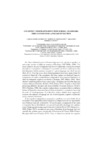Cognitive Constraints Built into Formal Grammars: Implications for Language Evolution

Use este enlace para citar
http://hdl.handle.net/2183/25096
A non ser que se indique outra cousa, a licenza do ítem descríbese como Atribución-NoComercial-SinDerivadas 3.0 España
Coleccións
- GI-LYS - Congresos, conferencias, etc. [71]
- OpenAIRE [359]
Metadatos
Mostrar o rexistro completo do ítemTítulo
Cognitive Constraints Built into Formal Grammars: Implications for Language EvolutionData
2020-04-17Cita bibliográfica
Cognitive Constraints Built Into Formal Grammars: Implications for Language Evolution. In Ravignani, A. et al., eds.: The Evolution of Language: Proceedings of the 13th International Conference (EvoLang13). Brussels, Belgium, 14-17 April 2020.
Resumo
[Abstract] We study the validity of the cognitive independence assumption using an ensemble of artificial syntactic structures from various classes of dependency grammars. Our findings show that memory limitations have permeated current linguistic conceptions of grammar, suggesting that it may not be possible to adequately capture our unbounded capacity for language without incorporating cognitive constraints into the grammar formalism.
Palabras chave
Formal grammars
Cognitive constraints
Language evolution
Dependency grammar
Projectivity
Mild non-projectivity
Memory constraints
Dependency lengths
Syntax
Cognitive constraints
Language evolution
Dependency grammar
Projectivity
Mild non-projectivity
Memory constraints
Dependency lengths
Syntax
Versión do editor
Dereitos
Atribución-NoComercial-SinDerivadas 3.0 España






